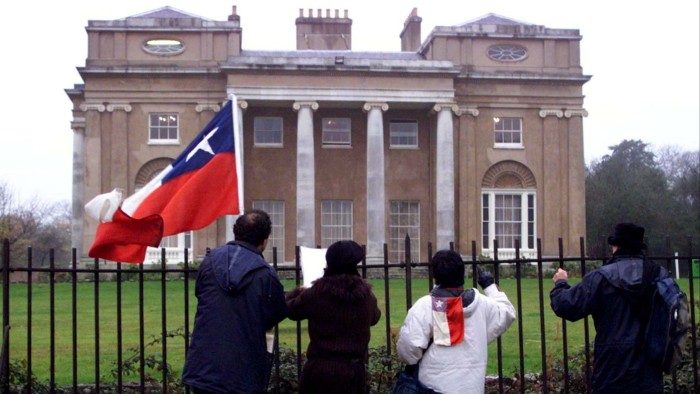Unlock the Editor’s Digest for free
Roula Khalaf, Editor of the FT, selects her favourite stories in this weekly newsletter.
In 1998, London barrister Philippe Sands was asked to represent Chile’s former dictator Augusto Pinochet in his claim for diplomatic immunity against charges of genocide and crimes against humanity. Sands’ wife told him that if he took the case, she would divorce him. He duly passed. Instead he made submissions on behalf of the campaign group Human Rights Watch.
For some people, this would simply be an anecdote. But Sands is a storyteller and a scholar, capable of turning scraps into an enthralling collage.
In 38 Londres Street, he uses his bit-part to tell two narratives. One is the fight to bring Pinochet to justice. It was, Sands writes, the first time a former head of state of one country had been “arrested by and in another, for committing international crimes”. The UK’s highest court had to decide whether Pinochet had immunity for torturing and disappearing political opponents after the 1973 coup that brought him to power (the key point: could such crimes be considered part of Pinochet’s official functions?).
The other narrative is Sands’ attempt to determine if Walter Rauff, a Nazi who oversaw the design and operation of Hitler’s mobile gas chambers, was involved in Pinochet’s crimes.
These questions of memory and impunity are forever timely. Many countries, including Chile and Spain, still wrestle with the truth of their 20th-century dictatorships. Last month former Philippine president Rodrigo Duterte was extradited to The Hague charged with crimes against humanity.
Sands’ East West Street, winner of the 2016 Baillie Gifford Prize, explored his family’s suffering in the Holocaust; some of them were killed in the gas vans designed by Rauff. In 38 Londres Street, he finds another personal connection: his mother-in-law was distantly related to Carmelo Soria, a UN official killed by Pinochet’s goons. We note the irony of Pinochet pleading diplomatic immunity when Soria’s was worthless.
The most vivid parts of the book relate to Rauff. The former SS officer escaped western captivity, sailed to South America, and even briefly worked for Israeli and West German intelligence. He then ran a crab cannery in Patagonia — deploying the same mechanical efficiency with which he had killed Jews and others. Each year he celebrated Hitler’s birthday.
Chile’s Supreme Court refused to extradite Rauff, a decision endorsed by left-wing president Salvador Allende. Pinochet later denied knowing the German. That was a lie. He had convinced him to move to Chile. For years, the word on Chile’s streets was that Rauff had played a role in the disappearances, which included using another canning company to transport bodies (and possibly turn them into fishmeal). Sands doggedly finds the evidence that gives truth to the rumours.
Parts of the book are long-winded. Regarding the Pinochet case, Sands has various over-clubby chats with old lawyers (a large proportion of these take place in Hampstead). Despite this, there is still much good detail.
The law lords ultimately ruled that Pinochet had immunity over most but not all of the charges, taking the sting out of extradition efforts. Pinochet was freed on medical grounds, even though to many observers he was fit to stand trial. (An aside: at The Hague, Duterte is also claiming health issues.) Sands presents evidence that the idea of Pinochet arguing medical grounds originated with Tony Blair’s 10 Downing Street.
This account makes clear that international law is shaped by politics, and by individuals. Baltasar Garzón — the vain, glorious Spanish investigating judge who indicted Pinochet — pulled off various manoeuvres to get as far as he did.
Rauff died in 1984. Pinochet died in 2006. Neither showed any remorse. Neither faced trial. Pinochet, called an “honourable soldier” by the British Conservative politician Norman Lamont, was revealed to have $26mn in US bank accounts under multiple names. By then, the UK government had paid £980,000 for his legal costs.
Sands doesn’t linger on whether historical legal cases are worth the effort. His worldview is that they are. He touches on the continued suffering of the disappeared victims’ relatives (a theme explored more fully in Walter Salles’s Oscar-winning Brazilian film I’m Still Here). He quotes a Chilean judge saying that the Pinochet arrest allowed more investigations into the disappeared. “The questions are endless, the interest remains,” says another judge, a comment that can be read in different ways. Sands’ own incremental findings took years of research.
The 1990s were a time of liberal idealism. Today, some might dream of bringing Vladimir Putin, Benjamin Netanyahu or Donald Trump to court, but the more urgent task is to limit the damage to democracy and human life. The devil’s advocate would say that pioneering international law efforts — often doomed to failure — matter more to the lawyers than to society at large.
This book makes the case that accountability is a worthy pursuit. The reader may also conclude that it is a very hard, very expensive and very partial consolation prize for what dictatorships do.
38 Londres Street: On Impunity, Pinochet in England and a Nazi in Patagonia by Philippe Sands, W&N £25, 480 pages
Join our online book group on Facebook at FT Books Café and follow FT Weekend on Instagram and X
Read the full article here

